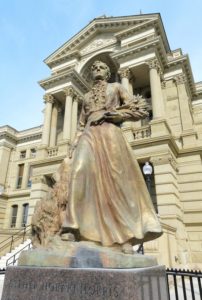 Wyoming is a state with a long history of firsts for women. Sebastian Modak of the New York Times writes that:
Wyoming is a state with a long history of firsts for women. Sebastian Modak of the New York Times writes that:
- In 1869, the Wyoming territory guaranteed women the right to vote—51 years before the guarantee of voting rights for women came with the passage of the 19th Amendment.
- In 1870, Esther Hobart Morris became the country’s first female justice of the peace in Wyoming; Martha Symons became the first female bailiff; Nellie Tayloe Ross became the first female governor of the United States in 1925 in Wyoming.
- In 2017, Affie Ellis became the first Native American elected to the Wyoming Senate. Ellis said she felt compelled to run for office when she took her daughter to a Senate debate and saw there was only one woman senator. When her daughter asked, “Mom, do they let girls be in the Senate?” she knew she had to run for office.
Nicholas Kristof writes about two present-day heroines for the New York Times. One, Nasrin Sotoudeh, is in Iran, and the other, Loujain al-Hathloul, is in Saudia Arabia. Both women have challenged the barbaric treatment of women in their respective countries:
- Nasrin Sotoudeh, 55, is a writer and human rights lawyer in Iran who has been sentenced to 38 years in prison plus 148 lashes. Her crime—advocating for the rights of women and abused children as a human rights lawyer and inspiring other activists to speak out and to refuse to wear head scarves as a protest against the oppression of women.
- Loujain al-Hathloul, 29, a leader of the Saudi women’s rights movement, has undergone months of imprisonment, torture, sexual harassment, water-boarding, and electric shocks. Her crimes—communicating with human rights groups and criticizing the Saudi government’s “guardianship” system, which restricts the movement and independence of all women.
Kristof has suggested that both women be nominated for the Nobel Peace Prize for confronting tyrants on behalf of women and girls. He implores us to keep awareness of their names and their treatment in the public sphere as this is their only hope for survival and/or release.
Dr. Karen Uhlenbeck, an American, has become the first woman to receive the Abel Prize for mathematics, an award modeled on the Nobel Prize, from the Norwegian Academy of Science and Letters. Kenneth Chang writes that Uhlenbeck helped pioneer a field known as geometric analysis and developed techniques commonly used by many mathematicians. She later worked on gauge theories in the field of physics. Uhlenbeck acknowledges that as part of the pioneering generation of women who were able to get real jobs in academia, she has been a role model for other women. She notes that there were no role models for her and states, “I never felt like one of the guys.” The only influential woman she could find to look up to was on television—Julia Child.
We all owe thanks and gratitude to these role models who inspire and encourage us to take courageous stands for ourselves and for others to make the world a better place.